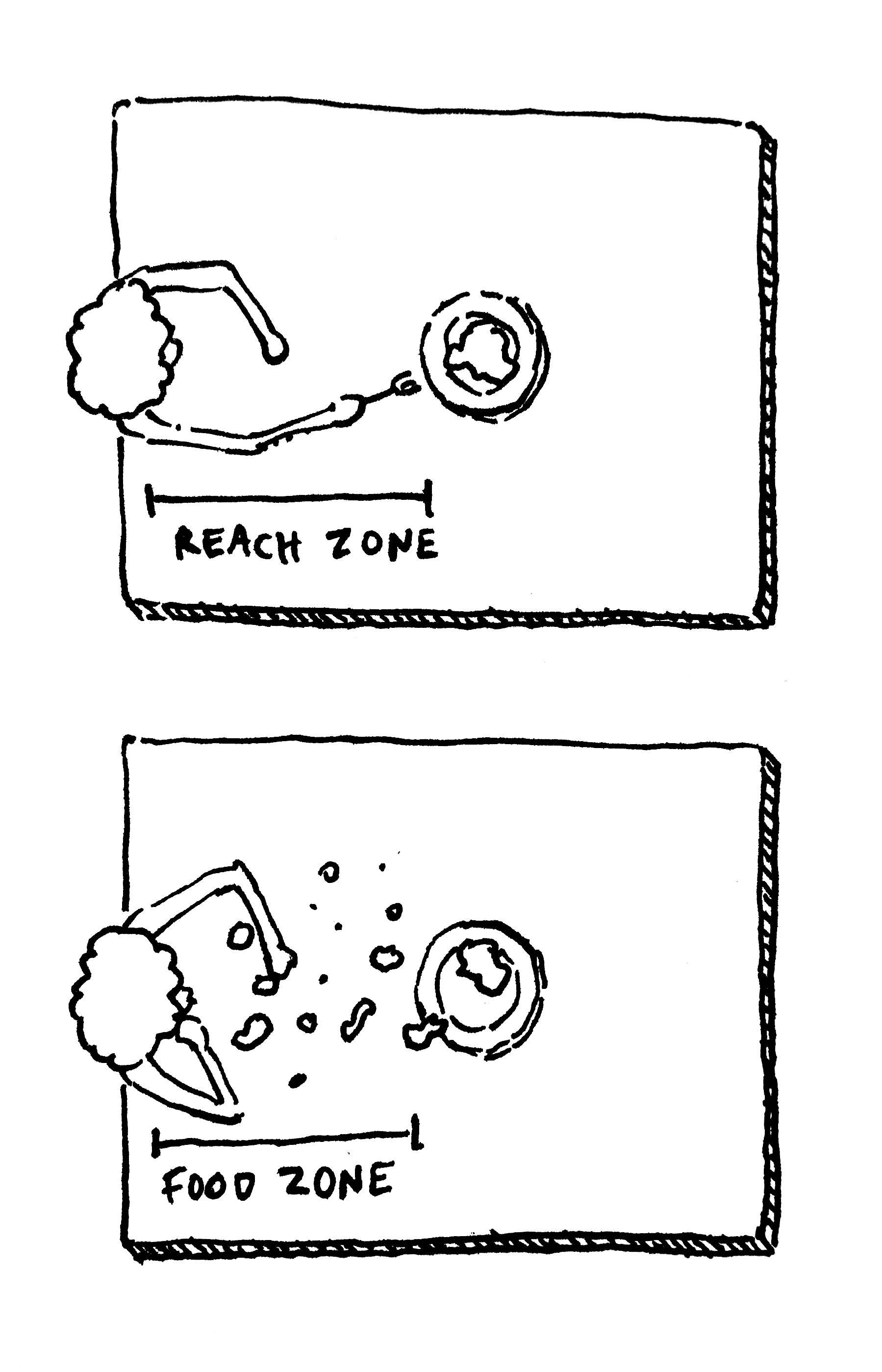#34 ☝️ The REPETITIONS required until it really sinks in ⏱
The umpteenth times
My son Neko and I have had this running gag since he was old enough to sit at the dinner table without a high chair. He gets his meal and then proceeds to eat it, but he’s placed his plate a bit too far away from him, so he has to reach across the table to scoop or grab the food. Inevitably some of it doesn’t survive the journey to his mouth. He has inherited my lanky monkey arms; the distance to cover is not insignificant.
I’ll say something like “Scoot your plate a little closer, buddy 😀”, or just gently slide the plate so that it’s directly in front of him, as is the convention for everyone else on the planet who eats.

Okay, I lied a little bit when I said it was a “gag”. I’m trying to make light of it, but it’s not really that funny. I included the 😀 emoji in the quote because the mouth is trying to smile but the eyes don’t necessarily share the mood. The only thing that’s really funny – perhaps ironic is the more appropriate term – is the number of times I’ve asked Neko to eat over his plate. Sometimes gently, sometimes with unconcealed exasperation.
Assuming twice a day since he was about two (he’s now ten), I’ve asked him nearly 6000 times.

The real joke isn’t that Neko remembers that eating over your plate is easier than not, and that he does it wrong on purpose to get a reaction. It’s that it seemingly never occurs to him even though I’ve told him nearly 6000 times.
This is what Neko and I laughed at over dinner the other night. When we calculated the sheer number.
So, I’ve been wondering: How many times do you say something before you give up altogether? And why is 6000 times not enough?
Statistical analysis
Eating too far from your food is not the only behaviour I’ve tried (unsuccessfully) to modify.
Our retrodoodle Teddy has just turned two. At least once every day I tell him not to lick the dishes in the open dishwasher. Factoring in that we didn’t get him until he was a few months old, that’s a little over 600 times.

Every time I see my kids out in the sun without a hat on, I say to them, “Pop a hat on, okay?” It will almost never occur to either of them to put one on, even though this is also reinforced by school – they’re not actually allowed to go out and play during the warmer terms without a hat. Assuming I’ve asked them each at least once during the summer months, I estimate I’ve asked them collectively to wear a hat just over a 1000 times.
My kids are pretty polite, but I still need to remind them to say please and thank you. Assuming I’ve been prompting them once every few days since they started talking, I estimate I’ve asked them collectively to say please or thank you over 1400 times.
The pleases and thank yous have actually turned into a legitimate gag that both Neko and I can laugh at. A few weeks ago I took him a drink in his room, and before leaving I asked casually, “Are you forgetting to say something?”
Neko looked up and grinned, realising I was asking for him to say one of those words adults insist children say.
“You may go,” he said.

Unless it’s your idea, it’s not an idea
When I was a kid my mum often used to say to me that I was “slow as a month of Sundays”, which offended me for two reasons:
- I thought Sundays were great. A lazy pace. Generally free from school commitments. Time for my mind to wander. If I’d been asked, I’d’ve said a month of Sundays sounds pretty idyllic, thank you very much.
- The measurement of pace was never mine. It didn’t seem to matter if I thought my pace was reasonable. Plus, it felt unfair to use someone else’s idea of Sunday (somnolent, lacking urgency) as a point of comparison.
Perhaps I was never motivated to be faster than a Sunday – has anyone ever stated such a goal out loud? – because the idea never came from me. It was imposed.

At teachers college we talked at length about intrinsic motivation: that holy grail where people come to learning of their own accord. If you’re intrinsically motivated towards learning something it’s more likely you’ll stick with it, make use of it, and recall it later.
Because it’s your idea, not someone else’s. Put another way: You can’t tell me what to do.
(When I was a teacher I found the challenge of creating the conditions for all students to be intrinsically motivated wildly difficult – almost insurmountable.)
“Intrinsic motivation underlies behaviours performed purely for interest and enjoyment; extrinsic motivation underlies behaviours performed to obtain separable rewards or avoid negative outcomes” — International Encyclopedia of Education
The number of times I’ve repeated something to my kids is likely less important than how personally relevant they feel the task or knowledge is to them. Most of the time it means less than nothing because these are my thoughts, not theirs, and these instructions come across as just that: just another dictum from an adult. Plus: I’m not even sure their brains have developed to the point where they can calculate the long-term consequences of a casual daily decision, like not wearing a hat in the harsh New Zealand sun.
There has never been another parent in history
For me, parenting seems to be about getting it wrong over and over again, and then realising in retrospect what the correct course of action was, and then occasionally getting it right in the future based on reaching a critical mass of prior mistakes. If you have multiple children, it appears to be about being way more strict with your first child than any following children, or vice versa, so that as they grow up these siblings can compare their experiences to form their own righteous opinions about justice and equality.

Parents, I’ve observed, can be particularly resistant to advice on parenting. This contributes to the difficulty of parenting because we tend to treat it like something we must learn from scratch, even though historically there has been a lot of parenting going on.
And the people whose parenting advice we typically end up most resistant to?
Our own parents.
We might not necessarily have asked for advice from our parents, but it was given to us. We aren’t intrinsically motivated, so the advice doesn’t stick. And we have a whole childhood of memories where we were constantly nagged with seemingly pointless instructions to say please and thank you, maintain our plate at the correct distance, and wear a hat.
How many times might we need to hear advice on parenting before we take heed of it? Or how many times might it need to play out the wrong way before we get it right?
Maybe 6000 times.
Universality
I guess this all means we should just give up, right? There is no point in trying to pass on any knowledge or advice because humans (particularly small humans and parent humans) are advice-resistant beings.
Well, no. What I’m starting to find is that the story within which advice is delivered is key. (Parenting is somewhat akin to marketing.)
Telling my son to shunt his plate closer has never really sunk in. (Because who cares? It’s just a thing your dad says, ad infinitum.) But then I told him that bringing things closer generally makes lots of things easier. You need the hockey ball to be close to control it. You need the sketchpad right in front of you for the drawing to turn out well.
And he finally started to listen. Because although he’s not inherently interested in the etiquette of dining, he likes hockey and art. Score.

Thoughts from your own brain
If you have any ideas or feedback – based on today’s newsletter or any other – feel free to get in touch. Would love to hear from you! 💛 You can just reply to this email, or add a comment online (if you’re reading this on the website).

Comments ()